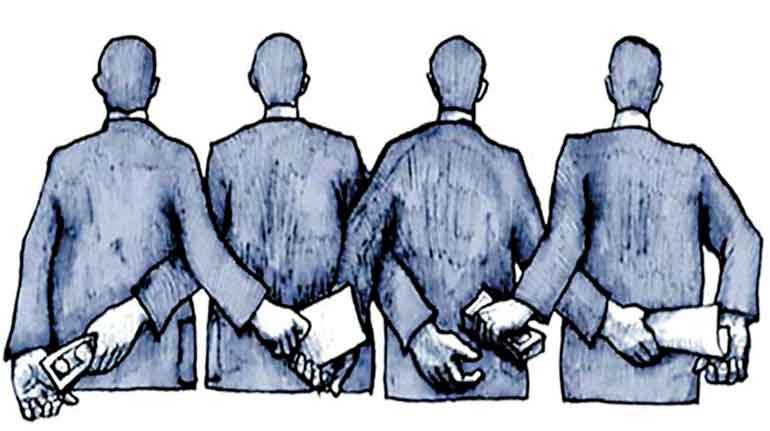Friday Feb 20, 2026
Friday Feb 20, 2026
Wednesday, 13 December 2023 00:05 - - {{hitsCtrl.values.hits}}

The ‘Civil Society Initiative on Anti-Corruption Reform for Economic Recovery,’ led by Transparency International Sri Lanka (TISL) and comprising Verité Research, Centre for Policy Alternatives (CPA), Sarvodaya Shramadana Movement, People’s Action for Free and Fair Elections (PAFFREL), and National Peace Council (NPC), has reiterate the urgent need for political will and genuine action towards anti-corruption governance reforms that are essential for sustainable economic recovery.
Following is the statement issued by the stakeholders to mark the International Anti-Corruption Day which fell on 3 December 2023.
We note the critical juncture the country is facing, where decisive action is expected by the citizens to spearhead the ‘system change’, the unified call of the unprecedented people’s movement last year. We also note the clear call by the international development partners, notably the International Monetary Fund (IMF) to initiative governance reforms that are essential to reach the economic recovery targets in the agreement. The recently published Governance Diagnostic Report of the IMF, as well as the Civil Society Governance Diagnostic Report on the Corruption Landscape of Sri Lanka underscore the imperative for comprehensive anti-corruption governance reforms, to combat the economic crisis rooted in weak governance and entrenched corruption.
Therefore, the ‘Civil Society Initiative on Anti-Corruption Reform for Economic Recovery,’ led by Transparency International Sri Lanka (TISL) and comprising Verité Research, Centre for Policy Alternatives (CPA), Sarvodaya Shramadana Movement, People’s Action for Free and Fair Elections (PAFFREL), and National Peace Council (NPC), makes an earnest call from policymakers, as well as the citizenry to not let this unique “reform moment” slip away.
As we observe International Anti-Corruption Day under the theme “UNCAC at 20: Uniting the World Against Corruption,” marking the 20th anniversary of the adoption of the United Nations Convention against Corruption (UNCAC), we emphasise that the governance reforms identified by the civil society and the IMF must be prioritised and implemented, if we are to recover and restore the economy.
TISL Executive Director, Nadishani Perera, said, “The recent landmark decision of the Supreme Court has confirmed our assertion that the economic crisis was caused by a governance failure. The court has emphasised that the crisis could have been averted if high-level decision-makers had acted in the best interests of the country, upholding the public trust bestowed upon policymakers who are duty bound to act as trustees of public resources. Corruption and poor governance in Sri Lanka steal away relief and development funds and prevent the funds reaching those most in need. This must be stopped at this critical time in order to uplift the lives of citizens, who are the actual causalities of this man-made crisis.”
The unfolding of the economic crisis and the people’s uprising seeking accountability and systems change demonstrated the serious breakdown of public trust in those in governance. It is paramount for the Government to earn back the public trust if it is to successfully implement any of the economic reforms. Towards this end, the Government must demonstrate its commitment to change through concrete actions of reform and by taking actions to end the startling levels of impunity for large scale corruption and abuse of power at the top levels prevailing in the country.
Any institution set up to combat corruption must comprise persons with integrity, appointed through an independent process that is respected and not undermined; and those appointed should be enabled to act with independence, without fear of repercussions.
An environment conducive for civic engagement, where people are able to access information and freely express their opinion as well as their dissent is vital for meaningful economic recovery. However, the Government’s conduct of violently suppressing public expression, intimidating and harassing those who dissent, disrespecting the separation of powers between the executive, legislature and the judiciary and attempting to introduce oppressive laws that curtail these freedoms, have been extremely harmful towards any sort of civic engagement.
Therefore, we urge the President and the Government to demonstrate their commitment towards transparent and accountable governance and equitable and sustainable economic recovery, transcending mere words and promises to actual implementation of the governance reforms specified in the governance diagnostics, while protecting the constitutionally guaranteed democratic rights and civic space.
We also call on all public representatives in Parliament to go beyond lip service and demonstrate their commitment to real system change through their actions. We request the international lenders and donors to maintain pressure towards governance reforms in order to ensure that their funds fulfill the purpose for which they are granted. We call upon the public to demand for governance and anti-corruption reforms as a non-negotiable deliverable towards economic recovery.